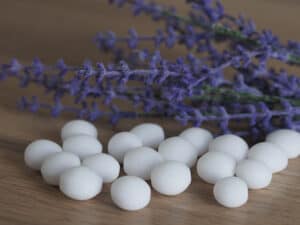How To Remove Stubborn Mildew Odors From Clothes
How to get mildew smell out of clothes is one of the most popular questions I have been asked. A nasty smell will prevent you from enjoying a fantastic party with your friends. Moreover, the mildew smell is also the main cause of many respiratory diseases.
As a result, finding helpful ways to treat these issues is extremely necessary. With good experiences, I will give you an ultimate guideline to get rid of the mildew smell from your life.
Continue to scroll down and find your answer now!

Mildew Smell – Several Facts That You May Not Know
Mildew is a type of mold presenting as a patch of gray on white fungi on a particular surface, moist area, for example. You can find mildew at various places at your house, such as clothing, leather, walls, paper, floors, or ceilings.(1)
According to many observations, mildew usually grows on cellulose-content clothes such as silk, jute, wool, cotton, and linen. Moreover, you can clearly see the mildew appearing on leather and suede.
Mildew smell is described as tangy and damp, like the smell you can hear from dirty socks. When you hear this kind of smell from your clothes, it’s sure that there is mildew occurring somewhere on your garment.
A common concern related to the mildew smell is whether this smell can negatively impact your health or not. I will explain this problem to you in the following section.
Interesting Differences Between Mildew And Mold
Mild and mold are two terms that often make many people confused. Mold is a fungus that has black or green color, and it is interpenetrable into different kinds of materials such as cardboard, wood, etc.
On the other hand, you can find mildew in the formof a white, gray patch of fungus that often appears on the dam surfaces such as clothes, paper, etc.
Is Mildew Smell Harmful To Your Health?
Some people may think that hearing mildew smell is not a severe problem because it just makes your nose uncomfortable. Unfortunately, the mildew smell does have negative influences on the body.
The allergy is the most common symptom when you have to smell mildew for a long time. In addition, you may also suffer from headaches, sore throat, or other respiratory diseases.(2)
On the other hand, if you can still hear the mildew smell on your garment, the possible emergence of mildew poses a threat to your skin. That’s why you have to identify the reasons for mildew present and then find the proper measures for this issue.
Let’s check your clothes right now if you see these signs:
What Causes Mildew Smell In Clothes?
I believe that when you get up and hear an unexpected smell on your clothes, the first question you can think of is, “ What does this mildew smell come from?”. It’s funky gases released by bacteria and fungi.
Some factors causing mildew smell on your clothes include humidity, temperature, clothing materials, and other external factors. If you keep the garment in a washer or a humid place for a long time, the opportunity of bacteria present will increase.
However, suppose that you’re very busy and forget to take your clothes out of the washer. In this situation, what can you do to let the mildew smell come off clothes?. Don’t hesitate to scroll down to know amazing tricks to overcome.
Wonderful Methods To Get Rid Of Mildew Smell From Your Clothes
Suppose that you are preparing for an interview with your expected company and suddenly hear a mildew smell from your suit although you have washed the previous day carefully. It’s a small accident, but that smell can be the reason for your interview failure.
Hence, the question is, how can I get the mildew smell out of my clothes? Look at these methods below and choose the suitable one for you!
Method 1: White Vinegar
Vinegar is the cleaning item that comes to my mind first. It is a natural-based product that is eco-friendly and effective in cleaning stains. In this article, I will introduce two options that you can choose depending on your available items.
Tools and supplies
- White vinegar
- Laundry detergent (For option 1)
- Baking soda (For option 2)
Option 1: White Vinegar And Laundry Detergent
Combining natural soap and vinegar for cleaning is not suggested, so you need to consider the type of laundry detergent before applying treatment.
During the wash cycle, you can pour enough vinegar into the washer. With a front-loading washing machine, you have to run the vinegar into the laundry dispenser.
Step 1: If there’s just a slight mildew smell or you have small loads of clothes to wash, you use ½ cup of white vinegar. On the contrary, if your garments have a strong mildew smell, you have to apply 1 cup of vinegar.
Step 2: Add laundry detergent and start to run your washing machine with the hottest setting.
Step 3: Dry your clothes. If your clothes still have a mildew smell, repeating the process is necessary.
For washing by hand, you use a cup of vinegar or mix vinegar with detergent to clean with warm water. After that, you can hang to dry as normal.
Note: If the odor is so strong, you have to pause the wash cycle and soak your clothes for one hour before adding more vinegar. If you don’t want to break the washing process, you can let the garment wash for the longest time.

Option 2: White Vinegar And Baking Soda
Step 1: Apply 1 cup of vinegar and run your washing machine in the hottest temperature setting. Remember to spread your garments uniformly.
Step 2: When the wash cycle finishes, add 1 cup of baking soda and wash again with the hottest setting.
Step 3: Dry your clothes with the help of the dryer. Otherwise, sunlight is a wonderful choice to make your garment dry for the best result.
Have you ever known this usage of vinegar before? Watch this video to know:
Method 2: Baking Soda
Baking soda is undeniably an essential ingredient in making a bakery and a cleaning tool to remove unwanted stains. If baking soda is available in your kitchen, this technique will be the best choice for you.
Tools and supplies
- White vinegar
- Baking soda
What you will do
Step 1: Add ½ or ¼ cup of baking soda to the washing machine.
Step 2: Wash your garment with white vinegar.
Step 3: Dry your clothes as usual. If the smell persists, you have to repeat the steps above.

Method 3: Oxygen Bleach
Many people prefer to use oxygen bleach because it doesn’t make significant changes in clothing color like other types of bleach, such as chlorine bleach. However, oxygen bleach can’t work with wool or silk fabrics. Thus, you need to check the care tag carefully.
Oxygen bleach will be the best solution for mildew smell caused by overused laundry detergent.
Tools and supplies
- Oxygen bleach
- Brush (optional)
What you will do
You use oxygen bleach as the placement of laundry detergent. The way to apply oxygen bleach is the same as your washing job every day.
In a different case, oxygen bleach can be a pretreatment method to make your garment clean in a more profound way. If you prefer this option, you can follow these steps:
Step 1: Apply a small quantity of oxygen bleach to the garment.
Step 2: Wait for 5-10 minutes before scrubbing your clothes with a brush.
Step 3: Launder in the washing machine.
Method 4: Borax
If you are finding an eco-friendly cleaning product with no harmful chemicals included, Borax is definitely what you want. Borax is easy-to-buy at any store or supermarket, so don’t worry about where to find this product.
First, you need to create a solution of ½ cup of Borax and 1 cup of hot water. If you see the solution dissolved entirely, you can pour it into the washer during the process of washing.
If you have used a laundry detergent with Borax content, you only need to wash as regularly.
Does Borax work with mildew smell? Let’s check now!
Method 5: Enzyme Odor Removers
The sweat or body smell can be the reason for the mildew smell on your clothes. In this situation, I recommend you use the enzyme odor remover. You can find this solution in some special laundry detergent, floor cleaners, or pet odor remover.
The substitute for enzyme remover is a laundry booster which is on sale in many stores. You can check whether a product contains enzymes or not by looking at their introduction on the package.
To get mildew smells out of your garments, you should add a suitable amount of this product to your washer.

Method 6: Lemon Juice
Thanks to the acid content, there are various applications based on lemon juice. One of them is to clean stains or greases on the clothes. It can prevent the development of bacteria and other health threats.
Tools and supplies
- Lemon juice
- Salt
- Washcloth or brush
What you will do
Step 1: Mix ⅓ cup of lemon juice to ⅓ cup of salt to make a thick paste. Then, you apply this paste to the stained area or heavy-odor places.
Step 2: Keep this state for 2 minutes.
Step 3: Use a washcloth or a brush to scrub on the stained area.
Step 4: Launder as usual.
An alternative way to use lemon juice is to pour it into a spray bottle and then apply it directly to the mildew stains. Depending on the fabric type, a mixture of lemon juice and water before using is necessary.

Method 7: Freeze Clothes
You may just hear “freeze food”, “freeze water”, but “ freeze clothes” seems to be very strange for you. Like how you preserve food by placing it in the freezer, the cold temperature can eliminate the mildew odors and kill the bacteria.
If you don’t want to launder your workout clothes despite short-time usage, you will need the help of the freezer!
First, you have to tighten your loads of garments and then put them in a Ziploc bag or any bag you can seal tightly. Next, you place the sealed clothing bag in the freezer for a few hours or overnight.
This technique is also an excellent choice to enhance the lifespan of your garment in the long term.
Method 8: Air Dry
The clothes dried naturally by sunlight often have a fresh smell and better avoid mildew than a dryer. The mildew smell sometimes originates from the lack of sun exposure, so hanging your clothes outdoors is the best solution to treat these smells.
Under the sun, the bacteria in your clothes will come off naturally, and you can also utilize the sunlight for bleaching.
You can use clothespins or clothespins to hang your clothes to dry. However, you should not let your clothes be exposed to sunlight over time to avoid color fading. This method works well with cotton and wool fabrics but has limitations on synthetic materials such as nylon.

Don’t miss these hacks when you get mildew smell out of clothes! Watch this video:
Say Goodbye With Mildew Smell With These Tricks
No one wants to wear clothes full of mildew smell to go to work or school and spend several hours getting mildew smell out of clothes. It’s fortunate that you can remove them completely, but what happens if these odors are still there? You have to throw them away.
How can I prevent this problem? Read my tips below, and you can breathe a sigh of relief!
Keep Your House Well-Ventilated
Moisture is the primary factor causing the growth of bacteria and fungus in your home. To preserve a well-ventilated atmosphere, you need to open the doors for sunlight coming into the rooms.
Otherwise, you can use a fan to saturate the air in your house. In addition, you can let the wardrobe open and place a small dehumidifier in it.
Hang Your Workout Clothes
Don’t throw your workout clothes into the washing machine or on the floor because damp clothes can enhance the humidity in your clothes and make the mildew easy to penetrate.
Before taking these clothes to wash, you can hang them on the shower rod or clothes hanger. Moreover, it’s not suggested to use fabric softener on synthetic workout garments.
Estimate The Amount Of Laundry Detergent
You should not overuse laundry detergent because it will be more challenging to wash out a heavy load of soaps.
Dry Your Garment After Washing
Remember to dry your garments as soon as the washing cycle finishes. Keeping your clothes in the washing bucket will create unwanted smells. If you forget to take your garments out, you should rewash them in a new rinse cycle.
Clean Your Washing Machine
The main cause of odors on your clothes is a dirty washing machine, so it’s crucial to keep your washer clean to avoid odors sticking to your garment. In case you can hear the mildew smell after washing, you need to clean your washing machine immediately.
Clean A Front-Loading Washing Machine
If you want to ensure your front-loading washing machine, you can follow these steps:
- Pour 1 cup of distilled white vinegar into the detergent dispenser
- Set the highest water level and run your washing machine with hot water
- Pour about ¼ -½ cup of baking soda into the drum
- Set the water level and water temperature at the highest pick and run a new rinse cycle
- Use a clean cloth to get any dirt out of the drum
Clean A Top-Loading Washing Machine
For a top-loading washing machine, you can follow this guideline:
- Pour 1 quart of white vinegar into the drum and set the hottest temperature and highest water level.
- Run the washing cycle for a few minutes
- Pause the process and let the washer sit for 1hour
- Continue the process
- Start a new rinse cycle with ½ – 1 cup of baking soda
- Use a cloth to get the inside out

Wash A Suitable Load Of Laundry
Don’t wash with a heavy load of laundry. If you take full of your garments to launder, the laundry detergent can not work well with all the clothes, causing the unclean status of some garments.
Turn The Inside Of Clothes Out Before Washing
Because the inside surface directly touches your body, the odors mainly focus on this side. That’s why turning out the inside will help you remove odors quicker than the way you usually do.
FAQs
Treating the mildew smell on your clothes is not difficult to work, but it requires many tools and steps to achieve the best result. If any questions occur during the process of washing, you can find extra information in this section.
Overcome The Fear Of Failure
When you suddenly hear the mildew smell on your clothes, you will think about rewashing your clothes. However, if the first method doesn’t work for you, you just need to keep trying other methods. Don’t throw your garment in the trash due to the first attempt failing.
If you have any experience of tackling this issue, you can leave a comment below. And don’t forget to like and share this helpful article with your family and friends!

References
1. En.m.wikipedia.org. 2021. Mildew – Wikipedia.
2. US EPA. 2021. Mold and Health | US EPA.







Samantha Lee
Head Cleaning Expert
Expertise
Professional Home Cleaning, Green Cleaning Techniques, Stain Removal & Fabric Care, DIY Home Maintenance & Organization, Sustainable Cleaning Products, Home Care for Busy Lifestyles
Education
University of Denver
Samantha Lee is the Head Cleaning Expert at HomeCleaningForYou.com, specializing in eco-friendly home care. She holds a Bachelor of Science in Environmental Science from the University of Denver, focusing on sustainable cleaning solutions.
With expertise in green cleaning, stain removal, and DIY home maintenance, she helps homeowners keep their spaces fresh and chemical-free. Samantha has been featured in lifestyle publications and has partnered with brands promoting natural cleaning products.
She also shares practical tips through her blog, online courses, and workshops. Passionate about sustainability, she enjoys testing new eco-friendly cleaning methods and spending time outdoors.